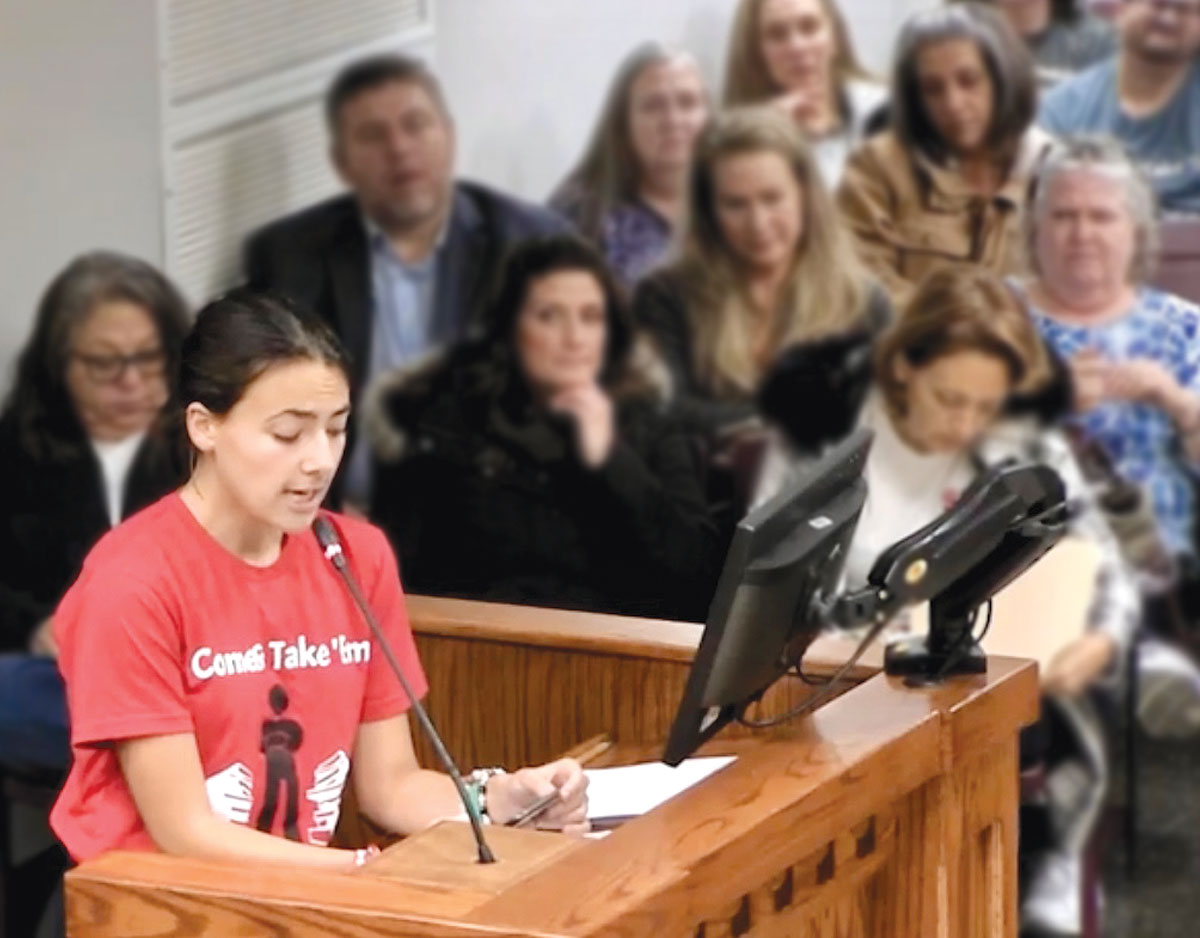Evolution of an Activist: Banned Books Week Youth Honorary Chair Julia Garnett Shares Her Story
Julia Garnett writes about the events that led her to speak at a school board meeting and why it was important to continue to use her voice and organize against censorship.
 |
Garnett is the 2024 Banned Books Week Youth Honorary Chair.Photo courtesy of Julia Garnett |
I am often asked how I became an activist, and my answer is always that I never set out to be one. I simply wanted to save a book that mattered to me, and I never stopped advocating.
I began high school as a quieter student, and I was never thrilled with the idea of public speaking. However, everything changed during my junior year, when my mom, an elementary school special education teacher, showed me a Facebook post in October 2022 about the book A Place Inside of Me by Zetta Elliott.
The post detailed how the school board was going to vote to decide if the book about a young Black boy’s emotions after witnessing a police shooting would remain on school library shelves. I immediately took to the internet to read this picture book and see exactly what angry parents in my community were going to war over. I did not find the hateful and divisive messaging some parents claimed lay within the pages. Instead, I found a moving work explaining real-life experiences in an accessible way for young people to understand. I discovered beautiful illustrations and powerful poetry meant to invoke empathy, not hate. It was hard to fathom why parents and school board members would fight this book being available for the students in my county. It was also worrisome that students from an array of backgrounds couldn’t access this title if it was removed. After all, reading outside of our perspectives is how we develop empathy.
 As the child of a teacher, I never had to worry about a lack of books. However, growing up gay, I did not have access to books with queer representation. I spent much of my life without the language or understanding to realize my identity. This left me to think that something was wrong with me, and discovering who I am taught me to value inclusion and fiercely protect diversity.
As the child of a teacher, I never had to worry about a lack of books. However, growing up gay, I did not have access to books with queer representation. I spent much of my life without the language or understanding to realize my identity. This left me to think that something was wrong with me, and discovering who I am taught me to value inclusion and fiercely protect diversity.
The night before my first school board meeting, I wrote a speech to defend A Place Inside of Me. I went into that meeting completely blind. I didn’t know the room would be so full that people would be sitting on the floor, or that the woman sitting behind me would be escorted out by a sheriff. It was my first time witnessing the division in my community that had long been simmering. When it was my turn to speak, I was terrified, but I also knew the importance my message carried as a student. Eventually, I got to the part of my speech that I had hastily written while watching board members bicker, and I decided to tell them they were acting like children. The silent room erupted with applause, and, in that moment, I realized that it wasn’t so scary to use my voice to call for change and defend what matters to me. I am happy to report the board voted to keep the book on our library shelves, and its number of readers greatly increased in the months following.
[READ: “We Need a Chorus of Voices, United in Our Determination to Protect Intellectual Freedom” | Opinion]
There’s something so empowering about making your voice heard, and I encourage anyone, no matter your age, to take this chance, even if it seems terrifying. One voice is often the key to inspiring others to form a chorus, creating a movement. I walked away from that meeting with a community of like-minded people I didn’t know existed until that night.
After defending A Place Inside of Me, I decided that students deserved to have a voice in the decisions made by review committees. These committees vote on challenged books before they go to the school board for a final decision. Each committee consisted of teachers, librarians, administrators, and even parents, but lacked the group most affected: students. I approached my principal about having a student on the committee and was told, “No. Absolutely not.”
As a young activist, I took that to mean “Change my mind.” So I wrote a speech with my ideas for how review committees could be improved. At the next school board meeting, I brought my concerns before the board with my principal in the audience. A week later, I found myself in my principal’s office with an invitation to be on the review committee for The Perks of Being a Wallflower by Stephen Chbosky. I proudly cast my vote to keep the book on my school’s shelves, which was a decision later respected by my school board.
At this point, I began to see myself as an activist and started looking for outside resources to support my work. I discovered Student Advocates for Speech created by the National Coalition Against Censorship. The program educates young leaders nationwide on combating censorship and raising awareness among our peers. I immediately joined the program, which provided me with more resources and connections than I could have imagined.
[READ: Uniting Against Censorship: A First-Person Account from Banned Books Week 2022 Youth Honorary Chair Cameron Samuels]
With their support, my work went beyond my community, with written testimony to the U.S. Senate Judiciary Committee, PSA videos, radio show appearances, and even the opportunity to interview author Lois Lowry about the censorship of her books. In addition, I was invited to the White House on October 11, 2023, for an International Day of the Girl event where I was recognized for my work combating censorship.
I also started a Student Advocates for Speech Club at my school. Our first year was a success, bringing many students together to talk about the history of censorship and what we can do to combat it.
Sadly, we couldn’t protect every book. We lost many to the chilling effect of strict state obscenity laws that put so much pressure on our amazing school librarians and forced them to pull books off the shelves to avoid potentially violating the law.
These losses solidify that you do not win every battle against censorship, especially not where we live in Tennessee. However, the more awareness we can bring to these books and the corruption of some of our elected officials, the more things can change in the future.
While I left my community to attend Smith College, I am confident in the inspiring students, librarians, and community members who will continue to push for change, one book at a time.
Julia Garnett is the Banned Books Week Youth Honorary Chair and a freshman at Smith College in Northampton, MA.
RELATED
The job outlook in 2030: Librarians will be in demand
The job outlook in 2030: Librarians will be in demand
ALREADY A SUBSCRIBER? LOG IN
We are currently offering this content for free. Sign up now to activate your personal profile, where you can save articles for future viewing






Add Comment :-
Be the first reader to comment.
Comment Policy:
Comment should not be empty !!!